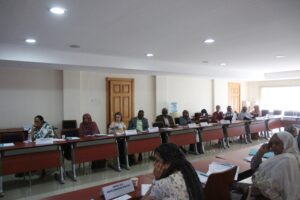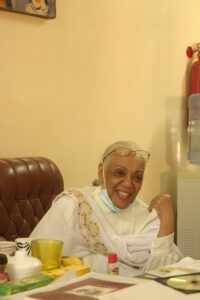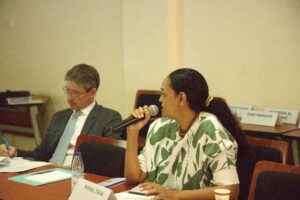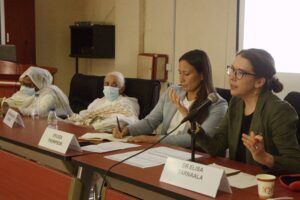Sudanese women are working to translate the demands of the revolution to concrete changes
Ahfad University for Women and CMI organized a roundtable discussion on 26 Feb in Omdurman, Sudan, to present the findings from a year-long research project on the motives, challenges and contributions of the women who participated in the 2018-2019 revolution, and to discuss the implications for broader political participation. The event took place within CMI’s initiative to support the political transition and the broader peace process in Sudan, and highlighted the importance of coalition-building, strengthening of political platforms and safe spaces for political engagement.

Ahfad University for Women and CMI’s roundtable discussion, 26th of February 2023. Photo: CMI
Women who participated in the 2018-2019 Sudanese revolution had a strong need to advocate for women’s right to live free from violence and discrimination and to counter the lack of respect for diversity and inclusion. Grievances accumulated over decades of authoritarian regime resulted in women joining the resistance movement not only to fight for their political, economic and social rights amidst the poor living conditions and plummeting economy, but also to repeal the public order law and family law frameworks oppressive to women.
The findings of the study highlight the central role of women, particularly young women, in both organizing the protest schedules and supervising their implementation. In addition, women played an essential role in shaping the discussion around legal frameworks that affect rights of women by redrafting provisions that limit the rights of women in the personal status law and family law through active campaigns both online and offline. While the contributions were notable, many women faced severe challenges such as physical and mental harassment, sexual abuse and intimidation on the streets as well as rejection of participation by their families and community. The generational differences, as well as cultural and religious aspects played a role in the latter.
Through successes of the revolution, however, women’s strong push resulted in shifting attitudes among families in terms of how they perceived and treated women and girls in comparison to their sons. Women received recognition for their key role in the revolution and more largely in the society, which has to a certain extent been reflected in the rise of women in decision-making positions (eg. the Governor of Blue Nile).

Photo: CMI
The Roundtable Discussion highlighted the need to bridge the formal and informal processes
Building on the research, the roundtable discussion brought together some 30 experts and policy actors from Sudan and the international community, and was chaired by Sylvia Thompson, Senior Manager of CMI and Professor Balghis Badri, Director of Gender Institute at Ahfad University.
The key focus of the conversation revolved around the developments on the role of women during and after the revolution, particularly whether the gains were permanent in areas outside the capital region. Many noted that women were not presented in the talks that led to the Juba Peace Agreement in 2020, and thus the agreement does not reflect the demands of the revolution. Similarly, there are concerns over the lack of women’s participation in the ongoing discussions on Security Sector Reform as well as more broadly in the security sector, which among other things is essential in ensuring the protection of women.
“We need to learn from the problems of marginalization of the past – the value of women is not seen as their contribution, but is shrunk into the importance of numbers”, stated one of the participants.
The participants agreed with the recommendation of the research that encouraged the development of a common women’s agenda, however, highlighting that it needs to be anchored in the cultural and religious realities of Sudan. The women’s agenda would need to incorporate and build consensus around the different needs and visions between the capital and the states and could serve as an important tool in pushing for increased political will around women’s meaningful participation.
“Representation does not mean inclusion of every single category – however, it means enough categories that most people feel they are represented”, one discussant shared.

Photo: CMI
Additionally, it was highlighted during the discussion that many people, particularly women and other marginalized groups, find themselves as part of informal processes parallel to the formal ones. Thus, it would be essential to bridge the gap between the formal and informal. Much of the forces needed to efficiently reform the formal processes exist in the informal spaces. As a result, women have been taking active action to shape the conversation around the changes to the oppressive legal frameworks, yet it has been the institutional and bureaucratic structures as well as lack of political will that has hindered the progression of these reforms.
Finally, Dr Elisa Tarnaala, Senior Advisor on Women in Peacemaking at CMI, shared her analysis attaching the conversation to regional trends, noting the rising importance of coalition building among women’s groups as well as the key demands by different protest movements globally, which focus on matters beyond women’s issues. Protest movements commonly share demands for the political system, economic justice, civil justice and global justice. When you look at as to why women protest, the first reason is often demands for changes in political system, the second is women’s rights (esp. stopping violence against women), third is stopping the war, and fourth is economic situation. These motivations came up in the study with Ahfad as well.

Together with Professor Balghis Badri from Ahfad University, the discussion was chaired by CMI’s Senior Advisor Dr. Elisa Tarnaala and Senior Manager Sylvia Thompson. Photo: CMI.
“It is essential to note that when we talk about political change, we cannot separate women’s rights from general political rights in a country”, Dr Tarnaala reiterated. “If the violence against women pertains, women do not have full equal rights. What good is full political rights if women continue to live in the risk of being killed at home? This is not particular to Sudan, or even the region – this is something that exist as a global struggle.”
CMI continues to work with Ahfad University for women by developing and broadening the research and its applicability, and is in the process of developing a database of qualified and interested women that could serve in the transitional government. Supporting women’s meaningful participation in peace processes and political decision-making is an institutional priority for CMI both in Sudan and beyond.